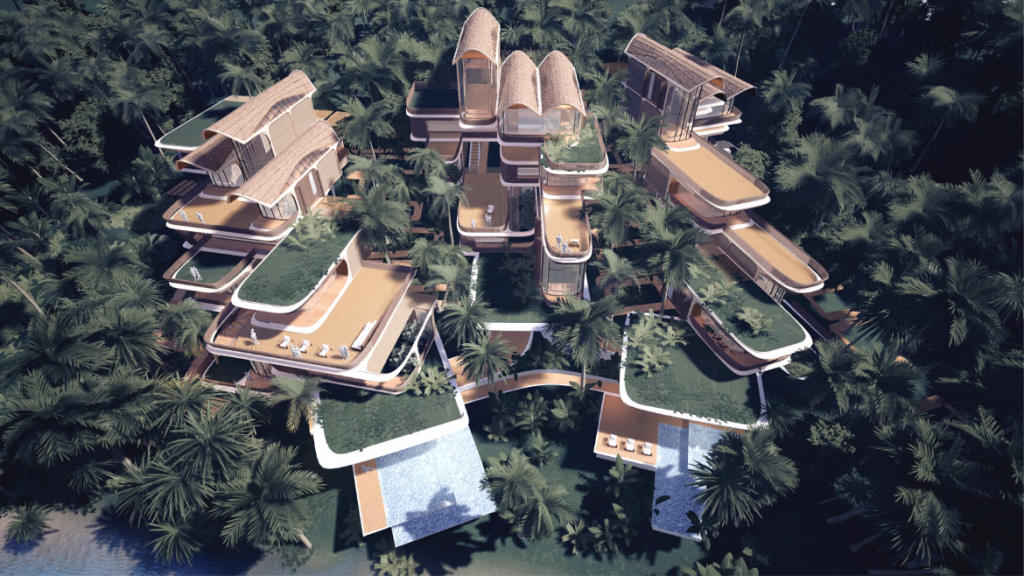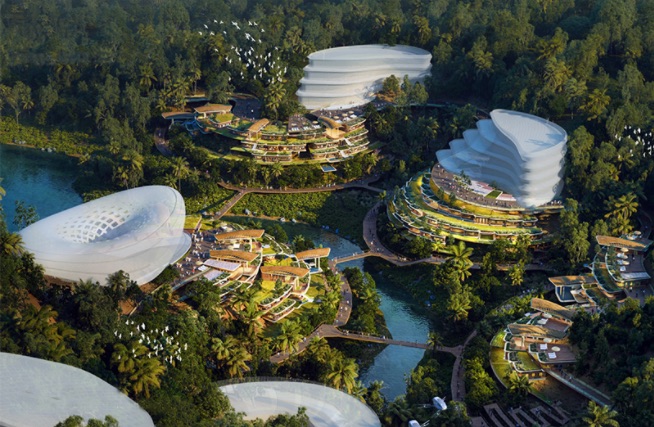RIO DE JANEIRO, BRAZIL – Dozens of workers build an industrial emporium in “model city Morazán”, one of at least three territories in Honduras authorized to function with their own laws and even their own police force. States within a state, rejected by the citizens.
Honduras’ version of charter cities, the Zones for Employment and Economic Development (ZEDE), are places designed to attract foreign investment and create jobs in a country where 70% of the population lives in poverty.
For civil society critics, they are areas that could serve as a refuge for fugitives from justice, evading national laws.
Articles 294, 303, and 329 of the Honduran Constitution and the ZEDE Organic Law allow the semi-autonomous jurisdiction to develop its own regulatory and administrative institutions. Reform or repeal of the ZEDE law needs two-thirds approval from the Honduran Congress.
Moreover, once a ZEDE’s population exceeds 100,000 inhabitants, the government has to hold a referendum on amendments.
Read also: Check out our coverage on Honduras
“They want to create states within the state of Honduras itself, to create new laws, new processes, new institutions,” opined the executive director of the independent National Anti-Corruption Council (CNA) Gabriela Castellanos.

According to her, “not only drug traffickers but also the corrupt” will be “protected” in these territories within Honduras.
The CNA, which brings together a large part of civil society, recently presented a citizens’ initiative before Congress to repeal the 2013 law that created the ZEDE.
WHAT ARE THEY, AND HOW DO THEY WORK?
The ZEDEs are promoted by President Juan Orlando Hernández and conceived as “extraterritorial fiscal and customs zones, different from those of the rest of the national territory.” Nationals and foreigners may invest in them.
They will be led by a Honduran technical secretary. According to the law, they will have to create their “internal security organs (…), including their own police”.
They will also have “autonomous courts” and will “collect their own taxes”. Although the Political Constitution prevails over it, “in what is applicable”.
For now, there are three under construction: one in Choloma (north), another in the paradisiacal Roatán -Bay Islands (Caribbean)- and the third in San Marcos de Colón (south). But seven coastal departments are open to investors, reports the government.
LEGAL FICTION
In Choloma, the “city of the maquilas”, 190 km north of the capital, Tegucigalpa, one of these large industrial emporiums, intended to export goods to the United States, is being built.
“The ZEDE in Choloma, before the law and before the municipal autonomy, does not exist,” because the owners “have not done any paperwork in the municipal corporation”, claims the city councilman of Choloma, Gustavo Mejía. Despite this, the work is moving forward.
About five years ago, when they announced “the construction of a large maquila, which was going to be the largest in Central America. I saved my vote [abstention] because they were going to destroy more than 10,000 trees,” Mejía complains.
The projects also imply the displacement of inhabitants from the areas destined for new buildings.
The powerful Honduran Council of Private Enterprise (Cohep) called on investors to abstain from participating in the ZEDE because the law “has vices of unconstitutionality”. “They are extraterritorial fiscal, and customs zones, different from the rest of the national territory,” and that is a “legal fiction,” Cohep sentenced.
Business associations, professionals, and universities have published manifestos against this, and in different areas of the country have come out in protest demonstrations.
But for the presidential delegate for the ZEDE, Arnaldo Castillo, it is just “one more investment platform”. “It’s private property. The ZEDE investors are going to let in whoever they want, it is a piece of land they bought,” he specifies.
“The nation is not going to fragment, a piece of land cannot be taken away by anyone,” adds Castillo, who is a member of the State Committee for the Adoption of Best Practices of the ZEDE, which will supervise these organizations.
DRUG TRAFFICKING?
In San Marcos de Colón (south), a ZEDE is being built to grow chili peppers and tomatoes that will begin to be exported to the United States in October.
It began with 34 hectares and will increase to 158 in the next four years, where it will employ 2,600 workers.
“It’s going to be governed by Honduran law. Am I going to have my own Supreme Court? No. That’s a fallacy,” says American Victor Wilson, owner of AgroAlpha, a partner in the project.
“Is the narco going to need a ZEDE to set up narcolandia? Let’s be serious,” he assures. He adds that the Honduran police will always be able to enter, protected by the law.
But for CNA researcher Odir Fernandez, the ZEDE “could create regulations that ultimately prohibit or limit the extradition processes that we see in the country.”
President Hernandez, whose government ends in 2022, has been accused by a convicted drug trafficker in New York of having received his support to export drugs.
The president’s brother is serving a life sentence in the United States for the same crime. Although Hernandez assures that the accusations are lies from drug lords that his government helped extradite.
“The United States is not going to allow this to be a refuge [for drug traffickers], nor is it convenient for us as Honduras,” says presidential delegate Castillo.
The UN has made a “respectful call” to Honduras “to review the compatibility of the constitutional and legal framework of the ZEDE with its international obligations to respect and guarantee the exercise of human rights.”


